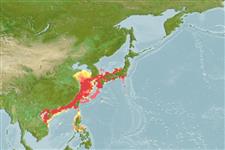Environment: milieu / climate zone / depth range / distribution range
Ecologie
marien; brak water benthopelagisch; oceanodroom (Ref. 51243); diepte 0 - 120 m (Ref. 43239). Temperate; 38°N - 13°N, 106°E - 141°E
Northwest Pacific: from central Vietnam to South Korea and Japan, Yellow and East China seas.
Lengte bij maturiteit / Grootte / Gewicht / Leeftijd
Maturity: Lm ?, range 17 - ? cm
Max length : 80.0 cm TL mannelijk / geslacht onbekend; (Ref. 4537); max. gepubliceerd gewicht: 243.60 g (Ref. 124479); max. gerapporteerde leeftijd: 6 Jaren (Ref. 104735)
Dorsale stekels (totaal): 9 - 10; Dorsale zachte stralen (totaal): 30-35; Anale stekels 2; Anale zachte stralen: 7 - 9; Wervels: 25 - 26. Body gold when fresh. Soft-rayed portions of dorsal and anal fins mostly covered with scales. Posterior part of pectoral fin not black. Anal soft rays usually 8 (Ref. 41299).
Inhabit coastal waters and estuaries (Ref. 2113). Found in muddy or muddy-sandy bottoms shallower than 120 m depth (Ref. 43239). Feed on crustaceans and fishes.
Levenscyclus en paargedrag
Maturiteit | Voortplanting | Paaien | Eieren | Fecunditeit | Larven
Masuda, H., K. Amaoka, C. Araga, T. Uyeno and T. Yoshino, 1984. The fishes of the Japanese Archipelago. Vol. 1. Tokai University Press, Tokyo, Japan. 437 p. (text). (Ref. 559)
Status op de Rode Lijst van het IUCN (Ref. 130435)
Gevaar voor de mens
Harmless
Gebruik door de mens
Visserij: van groot commercieel belang; Aquacultuur: commercieel; Aquarium: Commercieel
Tools
Speciale rapporten
Download XML
Internetbronnen
Estimates based on models
Preferred temperature (Ref.
123201): 20.8 - 24.7, mean 22.8 °C (based on 54 cells).
Fylogenetische diversiteitsindex (Ref.
82804): PD
50 = 0.6250 [Uniqueness, from 0.5 = low to 2.0 = high].
Bayesian length-weight: a=0.00891 (0.00582 - 0.01365), b=3.07 (2.95 - 3.19), in cm total length, based on LWR estimates for this species & (Sub)family-body (Ref.
93245).
Trofisch niveau (Ref.
69278): 3.7 ±0.56 se; based on food items.
Generation time: 5.2 ( na - na) years. Estimated as median ln(3)/K based on 2
growth studies.
Weerstandsvermogen (Ref.
120179): Gemiddeld, minimale populatieverdubbelingstijd 1,4-4,4 jaar (Assuming tm=2-4).
Prior r = 0.30, 95% CL = 0.20 - 0.45, Based on 1 stock assessment.
Fishing Vulnerability (Ref.
59153): Moderate vulnerability (42 of 100).
Climate Vulnerability (Ref.
125649): Very high vulnerability (88 of 100).
Nutrients (Ref.
124155): Calcium = 20.5 [11.6, 37.2] mg/100g; Iron = 0.245 [0.121, 0.428] mg/100g; Protein = 18.9 [17.8, 20.1] %; Omega3 = 0.573 [0.296, 1.059] g/100g; Selenium = 16.5 [8.1, 31.9] μg/100g; VitaminA = 13.9 [4.5, 45.8] μg/100g; Zinc = 0.555 [0.398, 0.808] mg/100g (wet weight); based on
nutrient studies.
